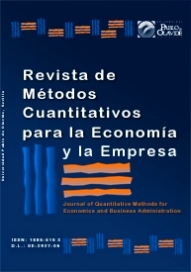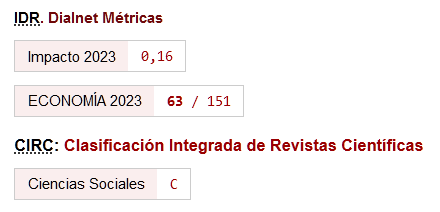Internacionalización y desempeño financiero en las Multilatinas colombianas
DOI:
https://doi.org/10.46661/rev.metodoscuant.econ.empresa.10640Palabras clave:
Multilatinas, internacionalización, desempeño financieroResumen
La investigación sobre las Multilatinas colombianas ha sido poco explorada en la literatura de negocios internacionales. Inicialmente, este trabajo muestra que los flujos de inversión extranjera de Colombia hacia el mundo presentan un crecimiento importante en los últimos años y ha aumentado la participación de las empresas colombianas entre las más grandes de América Latina. Con base en un panel de datos de once firmas colombianas para el período 2015-2022, se analiza la relación desempeño financiero-internacionalización. Los resultados econométricos indican que el desempeño financiero de las empresas colombianas mejora a partir de la expansión internacional
Descargas
Citas
Aguilera, R., Ciravegna, L., Cuervo-Cazurra, A., & González-Pérez, M. (2017). Multilatinas and the internationalization of Latin American firms. Journal of World Business, 52(4), 447-460.https://doi.org/10.1016/j.jwb.2017.05.006
Andonova, V., & Ruíz-Pava, G. (2016). The role of industry factors and intangible assets in company performance in Colombia. Journal of Business Research, 69(10), 4377-4384.https://doi.org/10.1016/j.jbusres.2016.03.060
AméricaEconomía (2022a). Rankings. https://www.americaeconomia.com/rankings/ (Fecha de ingreso: marzo de 2022).
AméricaEconomía (2022b). Las 500 mayores empresas de América Latina [The 500 largest enterprises from Latin American]. https://www.americaeconomia.com/negocios-industrias/Multilatinas/conozca-las-500-mayores-empresas-de-america-latina-2021 (Fecha de ingreso: marzo de 2022).
Arbelo, A., Arbelo-Pérez, M. & Pérez-Gómez, P. (2024). Internationalization and individual firm performance: a resource-based view. Eurasian Business Review, 1-35. (forthcoming) https://doi.org/10.1007/s40821-024-00276-5
Arellano, M., & Bond, S. (1991). Some tests of specification for panel data: Monte Carlo evidence and an application to employment equations. Review of Economic Studies, 58(2), 277-297.https://doi.org/10.2307/2297968
Arellano, M., & Bover, O. (1995). Another look at the instrumental variables estimation of error components models. Journal of Econometrics, 68(1), 29-51.https://doi.org/10.1016/0304-4076(94)01642-D
Bausch, A., & Krist, M. (2007). The effect of context-Related moderators on the internationalization-performance relationship: Evidence from meta-analysis. Management International Review, 47(3), 319-347.https://doi.org/10.1007/s11575-007-0019-z
Borda, A., Geleilate, J.S., Newburry, W., & Kundu, S. (2017). Firm internationalization, business group diversification and firm performance: The case of Latin American firms. Journal of Business Research, 72(C), 104-113.https://doi.org/10.1016/j.jbusres.2016.11.006
Botero-Pinzón, L.-D., Casillas, J. C. & Valencia-Cárdenas, M. (2019). The international profile of the firm: Application of latent profile analysis to the case of Colombia. Academia Revista Latinoamericana de Administración, 32(3), 392-410.https://doi.org/10.1108/ARLA-04-2018-0084
Buckley, P. J., Casson, M. C. (1976). The Future of the Multinational Enterprise. London: Mac-Millan.https://doi.org/10.1007/978-1-349-02899-3
Casanova, L. (2005). Latin America: economic and business context. The International Journal of Human Resource Management, 16(5), 2173-2188.https://doi.org/10.1080/09585190500358554
Casanova, L., Golstein, A., Almeida, A., Fraser, M., Molina, R., Hoeber, H., & Arruda, C., (2012). From Multilatinas to Global Latinas: The New Latin American Multinationals (Compilation Case Studies) IDB Publications (Books), Inter-American Development Bank, number 373, September. 234pp.
Contractor, F., Kumar, V., & Kundu, S. (2007). Nature of the relationship between international expansion and performance: The case of emerging market firms. Journal of World Business, 42(4), 401-425.https://doi.org/10.1016/j.jwb.2007.06.003
Contractor, F. J., Kundu, S. K., & Hsu, C. C. (2003). A three-stage theory of international expansion: The link between multinationality and performance in the service sector. Journal of International Business Studies, 34(1), 5-19.https://doi.org/10.1057/palgrave.jibs.8400003
Cuervo-Cazurra, A. (2008). The multinationalization of developing country MNEs: The case of Multilatinas. Journal of International Management, 14(2), 138-154.https://doi.org/10.1016/j.intman.2007.09.001
Cuervo-Cazurra, A. (2010). Multilatinas. Universia Busines Review, 25, 14-33.
Daniels, J. & Bracker, J. (1989). Profit performance: do foreign operations make a difference? Management International Review, 29(1), 46-56.
Maeseneire, W., Claeys, T. (2012). SMEs, Foreign Direct Investment and Financial Constraints: The Case of Belgium. International Business Review, 21(3), 408-424.https://doi.org/10.1016/j.ibusrev.2011.03.004
De Villa, M. (2016). From Multilatina to Global Latina: Unveiling the corporate-level international strategy choices of Grupo Nutresa.AD-minister, 29, 23-57.https://doi.org/10.17230/ad-minister.29.2
Dunning, J. H. (1980). Toward an eclectic theory of international production: Some empirical tests. Journal of International Business Studies, 11(1), 9-31.https://doi.org/10.1057/palgrave.jibs.8490593
Fletcher, R. (2001). A holistic approach to internationalization. Internationa Business Review, 10(1), 25-49.https://doi.org/10.1016/S0969-5931(00)00039-1
Fondo Monetario Internacional (2022). PIB por países. Tomado de: https://www.imf.org/external/datamapper/PPPSH@WEO/OEMDC/ADVEC/WEOWORLD (consultado en enero de 2022).
Forcadell, F.J., Romero-Jordán, D., Sanchez-Riofrio, A. & Guerras-Martín, L.Á. (2024). The effect of restructuring internationalized companies on performance: Evidence from European firms. European Management Review, 1-15. (forthcoming).https://doi.org/10.1111/emre.12672
Godbole, M., & R. L., M. (2024). Does internationalization and board diversity affect family firms' sustainable performance? Empirical evidence from an emerging economy. Business Strategy & Development, 7(2), 1-13. https://doi.org/10.1002/bsd2.365
Hitt, M. A., Bierman, L., Uhlenbruck, K., & Shimizu, K. (2006). The importance of resources in the internationalization of professional service firms: The good, the bad, and the ugly. Academy of Management Journal, 49(6), 1137-1157.
https://doi.org/10.5465/amj.2006.23478217
Hitt, M. A., Hoskisson, R. E., & Kim, H. (1997). International diversification: Effects on innovation and firm performance in product-diversified firms. Academy of Management Journal, 40(4), 767-798.https://doi.org/10.2307/256948
Hymer, S. (1976). The International Operations of National Firms: A study of Direct Foreign Investment. MA: MIT Press, Boston. Tesis. Universidad de Cambridge.
Johanson, J., & Vahlne, J. (1975). The Internationalization Process of the Firm-A Model of Knowledge Development and Increasing Foreign Market Commitments. International Marketing Review. Journal of International Business Studies, 8(1),23-32.https://doi.org/10.1057/palgrave.jibs.8490676
Kim, H., Wu, J., Schuler, D. A., y Hoskisson, R. E. (2020). Chinese multinationals' fast internationalization: Financial performance advantage in one region, disadvantage in another. Journal of International Business Studies, 51, 1076-1106.https://doi.org/10.1057/s41267-019-00279-9
Lee, H., y Park, J. (2006). Top team diversity, internationalization and the mediating effect of international alliances. British Journal of Management, 17(3), 195-213.https://doi.org/10.1111/j.1467-8551.2006.00501.x
Levin, A., Lin, C.F., & Chu, C.S.J. (2002). Unit Root Tests in Panel Data: Asymptotic and Finite Sample Properties. Journal of Econometrics, 108(1), 1-24.https://doi.org/10.1016/S0304-4076(01)00098-7
Lu J.W., & Beamish P.W. (2001). The internationalization and performance of SMEs. Strategic Management Journal, 22, (6/7), 565-586.
https://doi.org/10.1002/smj.184
Luu, T.D., Trinh, L.A., Nguyen, T.P.B., Ngo, N.L.C., Le, N.P.N. and Vu, N.V. (2023). Degree of internationalisation and firm performance: the flattening role of organisational slack resources. Review of International Business and Strategy, 33(5), 889-908.https://doi.org/10.1108/RIBS-03-2022-0030
Massó, M., Pérez-Yruela, M. (2017). La financiarización en España: ¿la emergencia de un nuevo modelo de acumulación?.Revista Española de Investigaciones Sociológicas, 157, 103-121.https://doi.org/10.5477/cis/reis.157.103
Mortimore, M. (2000). Corporate Strategies for FDI in the Context of Latin America's New Economic Model. World Development, 28(9), 1611-1626.
https://doi.org/10.1016/S0305-750X(00)00048-6
Nguyen, Q., & Sylvia, K. (2020). The multinationality and performance relationship: Revisiting the literature and exploring the implications. International Business Review, 29(2). 1-15.https://doi.org/10.1016/j.ibusrev.2020.101670
Porter, M.E. (1990). The Competitive Advantage of Nations. Harvard Business Review, 68, 73-93.https://doi.org/10.1007/978-1-349-11336-1
Rahman, M., Hack-Polay, D., Shafique, S. and Igwe, P.A. (2023). Dynamic capability of the firm: analysis of the impact of internationalisation on SME performance in an emerging economy. International Journal of Emerging Markets, 18(9), 2383-2401. https://doi.org/10.1108/IJOEM-02-2021-0236
Rugman, A. M. (1981). Inside the Multinationals: The Economics of Internal Markets. Croom Helm Ed. 179pp.
Rugman, A. M., & Sukpanich, N. (2006). Firm specific advantages, intra-regional sales and performance of multinational enterprises. The International Trade Journal, 20(3), 355-382.https://doi.org/10.1080/08853900600784088
Sapienza, H., Autio, E., George, G., Zahra, S. (2006). A Capabilities Perspective on the Effects of Early Internationalization on Firm Survival and Growth. The Academy of Management Review, 31(4), 914-933.https://doi.org/10.5465/amr.2006.22527465
Soeroto, W., Madyan, M., Daffa, M., & Rahmadani Setiawan, W. (2024). How Does Internationalization Affect The Performance Of Indonesian Family Firms With CEOs' Demographics As Moderators? Thailand and The World Economy, 42(3), 34-60.
Superintendencia de Sociedades de Colombia (2022). Las 1000 empresas más grandes de Colombia. Disponible en: https://www.datos.gov.co/browse?Informaci%C3%B3n-de-la-Entidad_Nombre-de-la-Entidad=Superintendencia+de+Sociedades (fecha de ingreso: marzo de 2022).
Thomas, D.E. (2006). International diversification and firm performance in Mexican firms: A curvilinear relationship? Journal of Business Research, 59(4), 501-507.https://doi.org/10.1016/j.jbusres.2005.08.008
Vernon, R. (1966). International Investment and International Trade in the Product Cycle. The Quarterly Journal of Economics, 80(2), 190-207.https://doi.org/10.2307/1880689
Williams, K. (2000). From Shareholder Value to Present Day Capitalism. Economy and Society, 29, 1-12.https://doi.org/10.1080/030851400360532
Williamson, O. E. (1981). The Modern Corporation: Origins, Evolution, Attributes. Journal of Economic Literature, 19(4), 1537-1568
Zarrouk, H., Galloway, L., Sherif, M., Elkaroui, E., y Al Mulla, A. (2020). "Entrepreneurial Orientation, Access to Financial Resources and SMEs' Business Performance: The Case of the United Arab Emirates." Journal of Asian Finance Economics and Business, 7(12), 465-474.
Publicado
Cómo citar
Número
Sección
Licencia
Derechos de autor 2024 Juan Camilo Galvis Ciro , Luz Dary Botero Pinzón, Iván de J. Montoya Gómez

Esta obra está bajo una licencia internacional Creative Commons Atribución-CompartirIgual 4.0.
El envío de un manuscrito a la Revista supone que el trabajo no ha sido publicado anteriormente (excepto en la forma de un abstract o como parte de una tesis), que no está bajo consideración para su publicación en ninguna otra revista o editorial y que, en caso de aceptación, los autores están conforme con la transferencia automática del copyright a la Revista para su publicación y difusión. Los autores retendrán los derechos de autor para usar y compartir su artículo con un uso personal, institucional o con fines docentes; igualmente retiene los derechos de patente, de marca registrada (en caso de que sean aplicables) o derechos morales de autor (incluyendo los datos de investigación).
Los artículos publicados en la Revista están sujetos a la licencia Creative Commons CC-BY-SA de tipo Reconocimiento-CompartirIgual. Se permite el uso comercial de la obra, reconociendo su autoría, y de las posibles obras derivadas, la distribución de las cuales se debe hacer con una licencia igual a la que regula la obra original.
Hasta el volumen 21 se ha estado empleando la versión de licencia CC-BY-SA 3.0 ES y se ha comenzado a usar la versión CC-BY-SA 4.0 desde el volumen 22.










